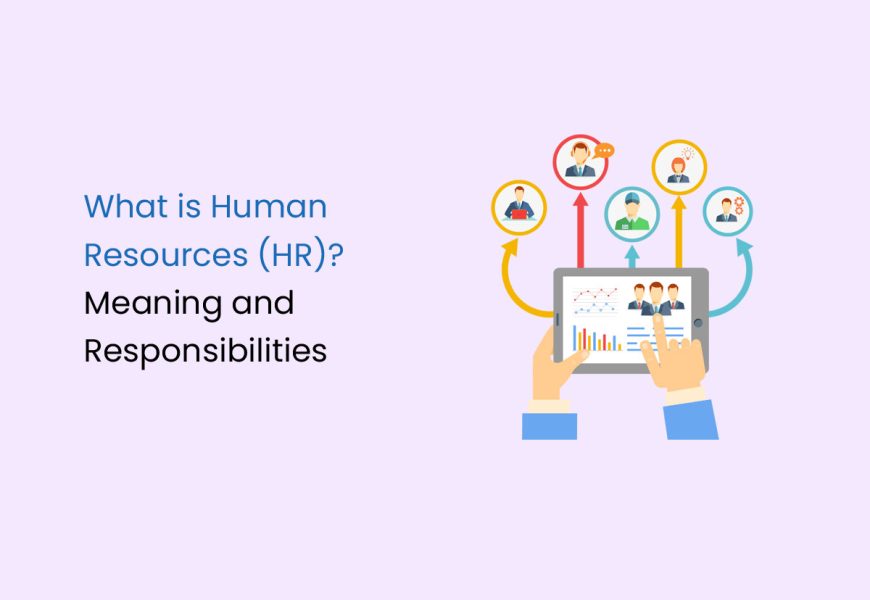What is the Full Form of HR?
The full form of HR is “Human Resources”. HR refers to the employees of an organization that comprise the workforce. As they work for the organization, they are considered a ‘resource’ for the company.
The HR department of a company or firm manages its employees efficiently. The task of the HR Department is to find and hire the right candidates for a company, which will give the company basic growth and build a quality workforce. HR also takes care of things including Employee Performance and compensation, undertakes their training, helps to keep them engaged with the organization, which leads to a friendly environment in the organization, maintains employee relations, and ensures a smooth and respectful exit process for departing employees.
Key Responsibilities of Human Resources (HR)
The HR department plays a pivotal role in an organisation, with a spectrum of duties that extend beyond the conventional realms of recruitment, administration, compensation and benefits, training and development, and employee relations. The following delineates the diverse responsibilities undertaken by an HR department:
Recruitment
As we know now, the full form of HR is Human Resources; their job roles are to maintain and create up-to-date job postings related to various vacant positions in the organization and post them on different job-seeking platforms. They are also responsible for choosing the eligible candidate for the job role and placing them in the correct position by offering competitive packages. To achieve this task, they shortlist resumes and conduct interview rounds based on the job preferences.
Administration
The Human Resources (full form of HR) department’s main responsibility is to handle administrative duties accurately and precisely. HR is responsible for keeping detailed records of employee information, including attendance, leave requests, and personal details. These records help with daily management and can also be important for legal purposes in case of audits or disputes. It is the responsibility of HR professionals to ensure that all such data is kept up to date and compliant with labour laws and company policies.
By looking after administrative tasks such as employee contracts, issuing offer letters to new joinees and also employee documentation, HR professionals ensure smooth operation and compliance with legal requirements of the company. Managing such important duties, HR’s make sure to maintain a proper structure within the company resulting in creating a supportive and trusting workplace for both employees and management.
Compensation and Benefits
HR also takes care of employee pay and extra benefits. They make sure salaries are paid on time and handle things like health insurance, savings plans, and retirement benefits. HR managers coordinate closely with finance departments or payroll vendors to ensure that all salary statements represent the correct earnings and deductions. HR’s engage in market research to assess competitors’ salary structures and make proposals to keep the business competitive. A well-organised approach to compensation attracts and retains top talent while also boosting employee morale.
If employees are looking for answers about payslips or deductions, any benefits for them, the HR department is responsible to communicate such queries. Also revising policies in response to government legislation or internal changes are done by HR. Such initiatives showcase the company’s dedication to employee well-being.
Training and Development
HR creates chances for employees to learn new skills and do better at their jobs. These learning programs help people stay motivated and grow in their roles. Whether it’s a new employee onboarding program or senior leadership development, HR makes sure training is relevant and accessible.
HR professionals identify skill gaps through regular assessments and feedback, then design training modules—either in-house or through external trainers. This can include technical training, soft skills workshops, compliance courses, or certifications. When companies give employees chances to keep learning, it helps everyone. The team becomes better at their jobs, and employees feel like the company supports their goals.
When companies help employees learn and grow, people feel more valued and are more likely to stay. Training programmes show that the company cares about their future.
Employee Relations and Performance Management
HR helps build a workplace where people feel respected and heard. They listen to employee concerns, help solve problems, and make sure everyone feels connected and supported at work.
HR creates evaluation frameworks for performance management that assist in fairly and consistently evaluating employees’ contributions. This includes establishing performance objectives, planning evaluation cycles, and providing helpful feedback. HR also advises managers on how to properly guide employees and carry out reviews.
HR works towards maintaining satisfaction with work, productivity, and harmony in the workplace by managing relationships and performance.
Work Culture
The Human Resources (HR) department plays an important role in building and maintaining a healthy work culture. Their goal is to create an environment where employees feel respected, heard, and part of a supportive team.
HR teams work to build a friendly and respectful workplace by encouraging clear communication and teamwork. They make sure everyone is treated fairly and help create an environment where the workforce feel safe, supported, and confident doing their jobs. A strong and ethical work culture not only improves job satisfaction but also boosts the company’s image as a great place to work. When people feel that their workplace truly values them, they’re more likely to stay loyal and perform at their best.
Attendance Management
Accurate attendance tracking is essential for HR as it directly impacts payroll and overall business operations. HR teams ensure that records of working hours, leave days, and overtime are properly managed and updated.
For this purpose, many organisations turn to advanced solutions like TankhaPay’s Attendance Management System. TankhaPay provides an easy-to-use, automated attendance management system with features like biometric integration, real-time leave tracking, and detailed overtime monitoring. Advanced software helps HR professionals improve accuracy, increase efficiency, and maintain transparency, while also making payroll management easier. TankhaPay’s Attendance Management System helps HR teams save time and reduce errors by automating key attendance tasks, allowing them to focus on more important goals.
Employee well-being
The well- being of every employee is a top priority for HR teams because it directly affects job satisfaction, retention, and productivity. When employees feel that their company cares about their well-being, they are more likely to remain loyal and engaged. Research shows that employees who receive support for their physical, mental, and emotional health are far less likely to look for new job opportunities.
HR professionals are key in creating well-being programs, like health initiatives and mental health support. By promoting a culture that cares about employees’ well-being, HR helps them feel valued and supported. When employees feel that the company values their well-being, it enhances their morale and motivation. They are more likely to stay engaged and perform better at work.
Managing Employee Concerns
Having concerns or complaints about their job or the company is very normal among employees. It is where HR professionals come up and address these issues fairly and in confidence. By giving solutions to the problems quickly and thoughtfully, HR creates a positive environment where employees feel valued, contributing to a healthier and more productive workplace.
Employee Data Management
Employee Data Management is about organizing and storing information like personal details, performance, and attendance. The HR team makes sure this data is accurate, secure, and compliant with laws. By keeping records up to date, HR improves tasks like payroll, recruitment, and performance reviews. It also helps offer better benefits and resolve issues quickly. Automation and system integration reduce errors and increase productivity. Overall HR’s role in managing employee data reduces risks and creates a positive work environment.
Human Resources (HR) Strategies
The Human Resources (HR) department plays a more important role than it did in the past. It’s no longer confined to just handling administrative tasks, managing payroll, or processing employee paperwork. In today’s organisations, HR plays an important role in shaping company goals, building a strong workplace culture, and ensuring long-term success. HR professionals are expected to align talent strategies with business goals to stay competitive.
The full form of HR—Human Resources—emphasises the fact that employees are among the most valuable assets of any organisation. Workforce capabilities are increasingly seen as a key driver of business growth and innovation. With this shift in perspective, HR has become a key player in areas like strategic workforce planning, succession management, employee engagement, diversity and inclusion, training, performance evaluation, and innovation.
An effective HR strategy involves much more than hiring and onboarding. It involves studying current workforce trends, forecasting future skill needs based on industry changes, and creating smart talent development plans. HR teams review internal data, track market trends, and use this information to build a strong and flexible workforce.
When a company wants to grow or bring in new technology, HR needs to make sure the right people are in place to support it. This can include training current staff, hiring new team members, or creating programmes to build future leaders. At the same time, HR should build a positive work culture where employees feel appreciated, respected, and encouraged to do their best.
Initiatives such as employee wellness programmes, flexible work policies, and continuous feedback systems have become integral to modern HR practices. These efforts not only enhance employee satisfaction but also boost retention rates and organisational productivity.
How Does HR Support Employees?
HR is there to help employees at every stage of their job. They make sure people feel supported, from the time they join the company until they leave or retire. Here are some of the main ways HR helps out-
Career Development Paths
HR provides clear and thorough information on the opportunities for growth within the organisation. This includes mentioning possible career paths, promotion criteria, skill development plans, and what steps needed to move into different roles by the employee. HR helps employees understand how to grow and advance their professional journey without leaving the organization with such clear and achievable growth opportunities.
When employees see a future with the organisation, they feel more motivated to do well and handle their duties better. This improves their involvement and job satisfaction. It also helps the company lower employee turnover, keep talented staff, and build a more skilled and steady workforce over time.
Continuing Education Opportunities
HR manages and promotes continuing education initiatives, such as tuition reimbursement, certification course sponsorships, and access to online learning platforms. Such programmes allow employees to improve their skills at their own pace.
HR encourages a culture of continuous learning by promoting these opportunities. HR teams often collaborate with educational institutions or online learning platforms to make learning affordable and accessible from anywhere, anytime. This enables employees to stay updated with industry trends, new technologies, and take on additional responsibilities.
After gaining new skills employees become more confident. This eventually helps their career growth but also boosts team performance, allowing the organisation to stay adaptable and competitive in a constantly changing landscape.
Managerial Training and Support
HR has an important role in helping managers grow their leadership skills apart from employee development.They provide managers with essential training on areas such as conflict resolution, effective team management, and the best ways to deliver constructive feedback. This training helps managers handle workplace challenges more effectively, making sure they can maintain a positive and productive environment for their teams.
When managers are properly trained, they are better equipped to address issues early, foster healthy working relationships, and motivate their teams to perform at their best. HR understands that strong leadership is key to a successful organisation, so investing in managerial development is an important part of creating a workplace where everyone can thrive.
Health and Wellness Programs
The organisation conducts wellness programmes to support employees’ health and well-being, which are managed and coordinated by the HR department.
These include yoga and meditation, counselling, access to gyms, and healthy eating tips. By offering these services, HR helps employees look after their body and mind, making it easier to handle stress and stay well.
When employees feel healthy and balanced, they are usually happier at work. This improves their energy, helps them get more done, and means they take fewer sick days. A healthy team creates a more positive and motivated workplace, where people can do their best and help the company succeed.
A Career in Human Resources (HR)
Opportunities in multiple industries become available when one chooses a profession in human resources. The full form of HR—Human Resources—reflects the profession’s focus on people and organisational development. From recruiting to compliance, there are numerous specialised and general roles available depending on the size and nature of the company.
- Employee Relations Manager: Focuses on building positive relationships between leaders and employees, addressing employee concerns, and resolving disputes between employees and company leadership.
- Recruiter: Recruiters find suitable candidates for job openings and manage the hiring process.
- HR Generalist: Oversees multiple HR functions in smaller organisations.
- HR Manager or Director: Leads the HR department and ensures alignment with business goals.
- Employee Relations Manager: Handles conflict resolution and employee engagement.
- Training and Development Specialist: Plans and executes learning programmes.
As companies continue to grow and adopt technology, the demand for HR professionals with both people skills and technical knowledge is increasing.
Skills You Need To Work in HR
To be effective in HR, professionals must possess a mix of interpersonal and technical skills.
- Communication: Communication is one of the important skills of HR professionals to handle interviews, resolve problems, and communicate policy more effectively.
- Analytical Thinking: A thorough understanding of workforce data trends facilitates well-informed decision making.
- Conflict Resolution: HR department’s one of the skills is to resolve conflicts in a simple manner that is important to maintain peace at the workplace.
- Organisation: Outstanding administrative abilities are necessary to manage paperwork, deadlines, and compliance.
- Ethical Judgement: Integrity is important as HR’s often deal with sensitive issues like misconduct.
- Training Ability: HR must be comfortable enough in designing and delivering educational sessions for employees.
These skills together enable HR professionals to navigate the complexities of workforce management while keeping employee welfare at the forefront.
HR and Its Relevance to Organisations
This term highlights the most vital asset of any company—its people. HR is essential for creating a structured, fair, and supportive work environment. From managing recruitment and payroll to overseeing performance and employee relations, HR touches every aspect of a business. Organisations that invest in a strong HR function often experience better employee retention, improved productivity, and a more resilient company culture.
Efficiency Driver
HR professionals must eliminate the company’s operation, which is becoming outdated and they no longer use it. While doing this, they also optimize existing workflows to ensure the company functions effectively. Hence, they act as a drive by implementing new technology and processes to improve the quality of work. HRs are also responsible for implementing new technology enablers by encouraging self-service adoption methods within a company.
Compliance Handler
HRs also develop the policies and regulations that govern the organization; hence, they are required to follow the regulatory guidelines and ensure that the company adheres to all statutory rules and regulations. Along with it, they ensure that the business is following ethical practices as well as providing equitable opportunities to its staff. They also ensure transparency within the organisation.
One of the key roles of the HRs is that to Develop the policies and regulation that governs the company and also ensure that the rules are works as a company as well as employee well being.
Business Strategist
HR is no longer limited to hiring or handling paperwork—it plays a key role in shaping business strategy. As business strategists, HR professionals work closely with company leadership to plan workforce needs, improve team performance, and align people practices with the company’s long-term goals.
HR reviews employee data, looks for any skill gaps, and plans hiring or training to support the organisation’s growth which eventually also supports employee’s growth. They help the firm grow, adapt to changes, and explore new areas by ensuring that the appropriate people are in the right positions at the right time. This ensures smooth operations and long-term success.
Work Environment Support
HR helps shape how people work together by encouraging a friendly and respectful atmosphere. They do more than just set rules—they support values like honesty, fairness, and teamwork, making sure these are part of everyday work life.
This includes creating ways to keep employees involved, making the onboarding process smooth, encouraging regular feedback, and supporting health and wellness activities. A strong company culture helps retain and attract talent, improves job satisfaction, and supports collaboration. By aligning everyday practices with the company’s mission and values, HR enables a culture that empowers employees to do their best work.
What are the Different Types of HR Roles?
The full form of HR—Human Resources—covers a wide range of responsibilities. HR professionals focus on different tasks depending on what they’re good at and the company’s needs.
- Talent Acquisition: One of the main jobs of talent acquisition is to find and hire the right people for the company. This includes writing simple and clear job descriptions, posting them on job websites, and going through applications from candidates. They also set up interviews and work with team managers to pick candidates who not only have the right skills but also fit well with the company’s work style and values. The goal isn’t just to fill a position but to bring in people who can grow with the company and become a strong part of the team.
- HR Operations: HR operations deal with the day-to-day tasks that keep the human resources department functioning smoothly. They are also in charge of keeping track of employee information, making sure that the salaries are paid on time, structuring offer letters and contracts, approving leave requests as well as keeping record of it along with using trusted HR software to manage it all efficiently. By handling these daily tasks, HR helps create a stable and reliable work environment. Well-managed HR operations make it easier for employees to focus on their jobs, while also helping the company stay on track with legal and policy requirements.
- Employee Engagement: HR aims to keep employees happy, motivated, and involved in the company’s mission. To do this, they organise things like appreciation programs, regular feedback, team activities, and open talks with staff. Employees who feel respected and part of the team tend to stay longer, perform better in their roles, and help create a more supportive and productive work environment.
- HR Analytics: HR analytics means the use of data to guide and improve human resource decisions. By analysing metrics such as employee turnover rates, hiring success, training outcomes, and performance levels, By looking at employee data, HR can understand what’s going well and where changes are needed. This helps them make better decisions about hiring, keeping staff happy, and using resources wisely. In this way, HR uses data to make smart choices that benefit the whole company.
- Compliance Officer: Compliance officers’ role is an important part in helping the company stay within the law. They make sure the business follows fair rules when hiring, keeps the workplace safe, and pays everyone properly. By keeping records updated and following the right steps, HR helps avoid legal troubles and builds a workplace where people feel secure and respected.
Understanding these many industries allows HR professionals to choose a path which aligns with their career objectives and strengths.
In Conclusion
HR is an essential part of any company that wishes to run smoothly without internal or external mismanagement and conflict. It is a booming field that shall stay relevant as long as businesses and their operations remain relevant.
In recent years, HR Analytics has emerged as a powerful tool that helps organizations make data-driven decisions about their workforce, from hiring to employee retention.
Modern HR departments are increasingly relying on HR Analytics to measure employee performance, predict turnover, and improve overall organizational efficiency.
FAQs about Human Resources (HR)
Is HR a Good Career?
HR can be a rewarding career for those interested in fostering positive workplace cultures, promoting employee development, and effectively managing talent within organizations.
Can I Get an HR Job Without an MBA?
Securing an HR role does not require an MBA. A valid Bachelor's degree is typically sufficient, with practical experience and HR knowledge being crucial factors.
Is HR a Tough Job?
Being an HR manager can present challenges, but it is ultimately a rewarding career. HR professionals navigate the balance between employee well-being and organisational efficiency.
How to Negotiate Salary with HR?
When negotiating salary with HR, it's crucial to begin by researching industry standards. Understand the typical salary range for your position, considering factors like experience and location. Armed with this knowledge, emphasise your worth during negotiations. Clearly articulate your skills and achievements and how they align with the company's objectives.
Patience is key during negotiations. Allow HR the time needed to review your proposal. Establish a bottom line – the minimum acceptable salary for you. However, be flexible and open to compromises that create a win-win situation for both parties.
What is the Meaning of HR?
HR, or Human Resources, is the department within an organisation responsible for managing personnel-related functions. This includes recruitment, training, employee relations, benefits administration, and fostering a positive work culture.
What is HR in a company?
In a company, the HR department plays a vital role in managing the organization's most valuable asset – its people. This involves recruiting and retaining talent, overseeing employee relations, administering benefits, and contributing to the development of a positive and productive work environment.
How to become HR?
To pursue a career in HR, start with obtaining a relevant degree, often in human resources, business administration, or a related field. Develop essential skills such as communication, problem-solving, and interpersonal abilities. Gain practical experience through internships or entry-level HR positions.
Consider obtaining certifications in the field to enhance your credentials. Networking with HR professionals and staying informed about industry trends are also essential steps in building a successful career in HR.
What is the full form of HR?
The full form of HR is Human Resources, reflecting its focus on managing and optimising the human capital within an organisation.














